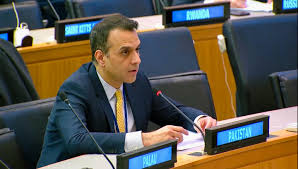UNITED NATIONS, Apr 17 (APP): Pakistan has called for addressing the “underlying cause” of the sharp deterioration in South Sudan’s political and security situation that threatens to undermine the peace gains achieved so far amid fears of renewed conflict, stressing the need for all parties to cease hostilities.
“Unfortunately, in less than two months, the discourse has shifted — the situation has worsened,” Ambassador Usman Jadoon, deputy permanent representative of Pakistan to the United Nations, told the UN Security Council at a briefing on the worsening situation in South Sudan.
“We share the concerns about possible further deterioration, and hence the need to de-escalate and address the underlying cause of this downward slide,” he added.
At the outset, Nicholas Haysom, Special Representative of the UN Secretary-General for South Sudan, warned that a political standoff between President Salva Kiir and former First Vice President Riek Machar – the two principal signatories to the 2018 Revitalized Peace Agreement – has now degenerated into direct military confrontation.
Volatility is mounting amid reports of renewed mobilization by the White Army militia and South Sudan People’s Defence Forces (SSPDF) in Upper Nile state, the alleged recruitment of children, and the deployment of Ugandan forces at the government’s request.
Misinformation, disinformation and hate speech are fueling political and ethnic tensions, it was pointed out.
“This situation is darkly reminiscent of the conflicts of 2013 and 2016, which cost over 400,000 lives,” Haysom said, briefing the 15-member Council.
“The overriding imperative now is to urgently avert a relapse into full-scale conflict, refocus efforts on accelerating the implementation of the Agreement, and advance the transition towards South Sudan’s first democratic elections,” he added.
In his remarks, , Ambassador Jadoon urged the parties to engage in good faith with Hayson, the UN representative, and with the regional mediation efforts, particularly by the African Union (AU), and other partners.
The Pakistani envoy said that the arrest of Machar, the former first vice president, and other senior members of the Sudan People’s Liberation Movement-in-Opposition (SPLM-IO) has undermined the peace process.
Pakistan, he said, supports the demand of African Union and others for the immediate and unconditional release of Machar and detained opposition figures to restore trust in the political process.
In this regard, Ambassador Jadoon called for the full implementation — without delay — of the Revitalized Peace Agreement. Voicing deep concern over the humanitarian crisis, he said it is being compounded by the rise in political tensions in a country where 9.3 million people – three quarters of the population – need assistance, and 7.7 million suffer from acute food insecurity.
Pointing out that the 2025 ‘Humanitarian Needs and Response Plan’ is only 10.5% resourced, the Pakistani envoy underscored the need for closing the funding gap to prevent famine and disease outbreaks.
Describing the United Nations Mission in South Sudan (UNMISS) as “a force of stability”, he commended the sacrifices and efforts of the peacekeepers to consolidate peace and development in South Sudan under challenging circumstances.
UNMISS, he said, has been instrumental in reducing community violence through its patrolling, noting that in a single month – March 20225 – the mission has conducted 8,551 patrols by land, air and river to protect civilians, deter conflict, and ensure the safe delivery of humanitarian aid as well as logistical supplies to its bases.
The Pakistani envoy said that UNMISS engineering contingents are rehabilitating thousands of kilometers of roads and other critical infrastructure to support safe communication, travel, trade, and peacebuilding.
“Peacekeeping engineers from Pakistan have built and are maintaining 80 kilometers of dykes in Bentiu, protecting 300,000 people stranded on a tiny sliver of land surrounded by 5,400 square kilometers of floodwaters,” he said while highlighting the contributions of Pakistani peacekeepers.

